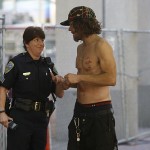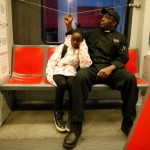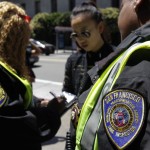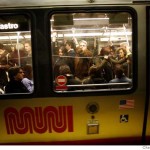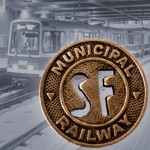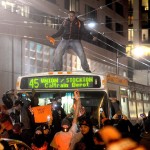All the Things I Hate! About San Francisco
Part One – MUNI
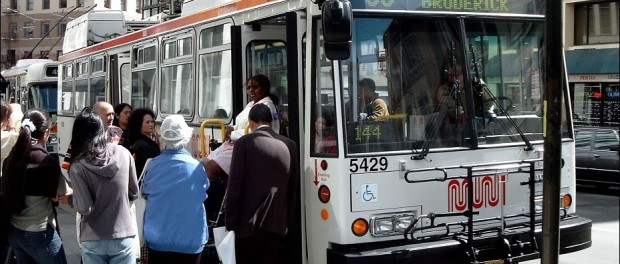
By Ron Merk
I have been living in San Francisco since 2003, and lived here back in 1979–1981, before spending nearly a quarter of a century in the film industry in Los Angeles. Like many people, I have a love/hate relationship with the city. There are so many things that are great – the natural beauty of the location, the lifestyle, restaurants and so many things to do. HOWEVER, yes in caps, a recent incident made me so angry, I realized that there was a list of things that were gnawing at me about living in the city by the bay (notice I don’t spell it with capital letters), and I thought I’d just get them off my chest. Agree or not, I think there are things that can improve our quality of life. I do not have specific solutions to the problems we all face on a day-to-day basis, but I think I can offer a perspective based on my long experience living in cities like New York and Los Angeles, and maybe you will come to understand that I really want to help rather than be critical. But help starts with being critical. Critical thinking must be applied.
I’m going to start with MUNI. I’ve had a love/hate relationship with MUNI for a long time. Most of the time, it works perfectly. Good schedule, clean cars, courteous drives and riders. But there are always things that can be improved. So, here goes.
NO PAY – NO WAY!
MUNI just raised its rates again, and it really annoyed me for many reasons, mostly because if MUNI was doing its job, they would not have to raise fares, they’d have a surplus. I ride the MUNI system almost every day, taking the trams, the underground and buses. The drivers do nothing about the people who get on without paying. I’ve actually made a point of counting how many don’t pay as I ride. It’s 40%, yes forty per cent. Four out of every ten people do NOT pay. That’s nearly ten dollars in lost revenue for MUNI for those four people. Lately I’ve noticed it’s close to fifty per cent who do not pay. To be fair, some are clearly homeless and probably have no money. But, there’s a whole other population that seems to think that rides should be free. They just get on, acting as if they owned the bus or tram, with this annoying “entitled” look on their faces, almost daring us to say something to them. The drivers apparently do not want to confront them, and don’t demand they pay or get off the vehicle. Yes, there are a handful of fare inspectors, but hardly enough to police the huge number of people who do not pay. The rest of us have the privilege of paying for these free-riders through fares increases.
How to fix this? Institute a zero tolerance for no-pays. I spend time in Turkey each year, and the drivers there just tell someone who hasn’t paid to get off the bus. Period. All the riders pay, and they support the drivers in every way when this happens. Turkish riders actually get really verbal when someone tries to get on for free. People there just consider it the right thing to do to pay one’s share of the cost of running the system. If the MUNI drivers are afraid to confront people, then MUNI and the drivers’ union need to train them on how to do this. That 40% (or 50%?!) of income that MUNI is missing out on could also help pay for more fare inspectors and all the demands the union is making on MUNI for increased salaries, benefits, etc. But I think there’s another solution. Have a very low income monthly card. Everyone who’s getting any form of public assistance (cash aid, food stamps, disability, etc.) should have this card automatically added to their benefits and some small amount automatically deducted from their benefits. There would simply be no option to NOT have this money deducted. Ten bucks for adults and $2.50 for each dependent child. Even ten dollars a month would be better than nothing. It’s a simple solution. Everyone pays, no exceptions. Ten dollars times the number of all the people who don’t pay is a whole pile of money.
SHUT THE F—K UP!
Now, the issue of noisy people on MUNI. I don’t like to single out any “demographic” but from my observations, the noisiest and more rude riders are teenage girls and early twenties women. Now before anyone gets their knickers in a twist, this is purely anecdotal. These unruly females curse and screech verbal abuse better than any sailor ever could. I hear the words “fuck” and “bitch” more from them than anyone else. Surprising, isn’t it? It certainly surprised me.
The only way to stop it is to ask them to stop. Do it kindly, quietly, with a voice of authority. If they sass you, go to the driver, ask him to stop the vehicle and deal with the ruckus on his vehicle. If he refuses, then get his name and report him to both MUNI and the union. What next? Go back to the noise-makers and tell them if they don’t stop their verbal abuse, they’ll have to get off the bus. Ask other riders to join you in this effort. Groups are more powerful than individuals in dealing with sociopaths. If the noisemakers refuse to shut up, call 911 on your cell and report a public disturbance. They have to respond. I guarantee you that the noisemakers will get really quiet when the police show up.
Sure, this is a drastic measure, but there is NO EXCUSE for acting out on a public conveyance, and there should be a zero tolerance for bad behavior just as there should be for people who don’t pay the fare.
And then there are the loud music players, people blasting their eardrums with music so loud (and often for me so annoying) that we all can hear it. Again, a simple request to turn it off (or at least down so it can only be heard by the person carrying the device) would go a long way. Social pressure can also help. Ask others to join in and confront the music man (or woman). I’ve found that most of the time it’s men, and only occasionally a woman who plays music loudly. That’s just my personal observation, with no science being suggested here.
The rest of us do not deserve to be treated without respect and consideration. Remember that thing we used to call civilized behavior? And how we used to expect it when in public.
MUNI NEEDS TO IMPROVE AND MAINTAIN THEIR SCHEDULES
I can’t tell you how many times I’ve stood at the corner of 9th Street and Market, in that cold gale wind that blows off of Twin Peaks waiting for the F Train to show up. Their schedule seems the most erratic of all the lines. Okay, there’s also the J Church. Sometimes I’ve waited 30 minutes, only to see two or three trams show up in a row. It’s really frustrating in the age of computers that MUNI can’t space out the cars so that they arrive every ten or twelve minutes.
There are never enough J-Church trains, especially at the evening rush hour. Put on a few extra ones for an hour or two during the crunch times. Otherwise, we’re jammed in like sardines in a can, and sometimes can’t even get in because the train is totally full. Then we have to wait another 20-30 minutes for another car. I’ve heard these horror stories from many of my friends and work colleagues. We need to get the schedule working for the riders. We pay the bills, and no one else! We deserve regular schedules and comfortable, safe riding conditions.
I am pretty sure that all MUNI vehicles all have GPS in them, and it would be easy to create a program to space the cars our and guarantee that they arrive in a regular time frame so that we do not have to wait longer than 15 minutes for a ride. Computers can easily do this, if someone would get off their lazy rear end and do something about it. Of course, there are equipment breakdowns and traffic problems, and there’s nothing that can be done about that. But if the city government really want people to use their cars less, then make public transit better, easy to use, and with reliable schedules.
DON’T LEAVE YOUR GARBAGE FOR ME TO CLEAN UP!
There are very clear rules about eating, drinking, smoking or playing loud music on public transit. Once again, the rules are not being enforced by the drivers. If they see someone boarding the vehicle, with their big greasy bag of McDonalds carbs, they can remind that passenger that there’s no eating on board. I don’t mind someone sitting next to me holding their Starbucks cup, but I do mind if they just “leave it behind” because they’re too lazy to find a trash can in which to deposit THEIR trash. I really prefer that people wouldn’t eat their fast food while sitting next to me. There’s nothing more stomach turning than the smell of greasy fried fast food. When the leave behind their nasty bags and wrappers, dripping in grease for others to clean up or accidentally sit on, it really ticks me off. This is another issue that drivers need to address. If someone is getting on with food or drink visible, the drivers need to tell them to get rid of it before they enter or remind that that there’s no eating or drinking on the vehicle. Simple. Do we really need guards to enforce the rules? If so, let’s collect that 40% of the fares not being paid, and put on what we used to call “conductors” in the good old days when the social contract was not shattered by rampant bad behavior in public.
PEOPLE WITH BEHAVIORAL PROBLEMS OR MENTAL ILLNESS
We are seeing more and more homeless and mentally ill people on both the streets and on public transit. They are often dirty, smell bad, sometimes behave badly or aggressively, or are just “in another world” of their own making (by this I mean mentally ill). It seems that society and most of us have no idea how to interact with them. Situations that involve them can range from the uncomfortable, to unpleasant, to completely unbearable. Kindness and compassion are the best starting points. These people were once someone’s beautiful baby. What brought them so low is unknowable to us. But we should treat them with kindly and respectfully until their behavior requires a different response. Frankly I worry about things like catching lice when someone in filthy rags sits down next to me and starts scratching. But I think we have to be careful not to be reactionary. We all inhabit the same planet and we must find ways of getting along, until such time as that becomes impossible. Not being a trained mental health professional, I will not presume to know what to do when someone begins to act strangely, or starts yelling or becomes aggressive, nor would I suggest any advice. Only common sense can be applied. Sure, we can do or say the wrong thing, and escalate a bad situation, but only because of our ignorance of their condition and how to deal with them.
However, let me tell you about an experience I had on the F Train about six months ago. I was riding with a close friend, sitting across from a woman with two small children, both girls about 5 and 7 years old. A man that for the sake of this piece we’ll refer to as “indigent” based on his apparent hygiene, filthy clothes and obvious bad smell, was standing between us and became very agitated and started screaming words not acceptable for young children to hear. He was swinging his arms, and everyone around him had to back away, for fear of being slugged. The two children became frightened and the mother was not sure what to do or say. She looked at me for help. I don’t know why she chose me, but she did. As I began to get up to intercede, my friend pulled me by the arm so that I would sit back down. But the man was yelling louder and louder.
The tram had just come to a stop, and I called to the driver to come and help. But the stupid jerk just sat there like a stone, refusing to respond to my call for help, or maybe just afraid to intercede. So, finally I got up, and in my deepest, calmest voice, I told the man that he had to calm down, lower his voice, and not frighten the children. But he kept yelling. So, I raised my volume, keeping the pitch low and as authoritarian as I could. I told him that he had to get off the tram. He screamed some more. I then told him that if he didn’t get off the tram I was going to drag him off. He finally started moving toward the door, screaming the whole way, and got off. Then he came back, clearly intent on re-boarding the tram. He looked at me, and I just told him to stay off and keep walking away. He finally disappeared into a crowd on Van Ness Avenue.
The woman across from me smiled, hugging her children, and said to me, “Thank You.” No one around me except my friend paid any attention to what happened, and no one else offered to help. Except for the woman, no one even acknowledged that anything had happened. Clearly, there’s something wrong with that, and I’m sad that no one wanted to take a chance to protect those children.
Someone to whom I told this story thought I had acted unfairly regarding the poor mentally ill guy, and that he had a perfect right to ride the tram. My response to them was that I made a choice, to help those hapless children because they had their lives in front of them. The mentally ill guy probably had his life behind him with not much future, and probably never will be well. Yes, a hard choice. Like triage during a disaster. And yes, I felt bad for the guy. But it was him or the children.
Is there an answer to this situation with the homeless and mentally ill? Sure, it’s called political will and the funding to help these poor, abandoned people. The problem will not go away. It will get worse unless something is done about it.
SPEAK QUIETLY, BECAUSE I REALLY DON’T WANT TO HEAR YOUR LIFE STORY, NOT MATTER HOW INTERESTING YOU THINK IT IS.
Last, but not least, everyone needs to lower the volume of their speaking on public transit. Just lean closer to the person you’re addressing. I really don’t want to hear about someone else’s sex life, partner’s infidelity, toilet problems in the morning, or why they think the government is out to get us. Keep your private conversations private. It’s possible in public by just thinking before you speak, and keeping your voice low. Remember, “someone” could be listening…..and “report” what you say to “someone else!” Yes, I’m being facetious. If you really have to communicate on public transit, try texting. I know there are good reasons. But most of what I hear in public phone calls is just jibber-jabber that can wait until later. So, next time you’re thinking of having a lengthy phone call on public transit, think about the rest of us who really would prefer if you would just zip it.
WHAT DO WE GET IF ALL THESE CHANGES ARE MADE?
Order, peace, and a return of a truly civilized society. Maybe for some of us it will remind us of the good old days when people got dressed up to go downtown, or to a bank, and when children were told to be very quiet in public and respect everyone around them. R-E-S-P-E-C-T – not just a lyric from a and old rock ‘n’ roll song. We need to get it back, from everyone, and we need to give it to everyone, especially on public transit. What a nice ride that will be……for all of us.

